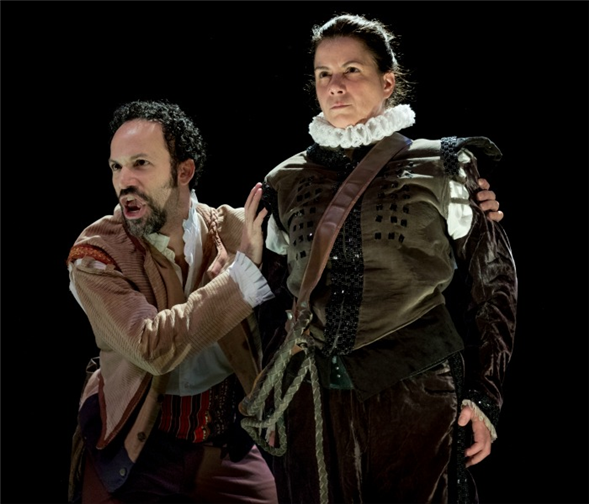Translate Page

Repertorio Español resurrects the work of Spanish Golden Age female playwrights
---
Leonor, the protagonist of Valor, agravio y mujer (Courage, Betrayal, and a Woman Scorned), has all the makings of a contemporary shero. When her lover betrays her, she puts on pants and exacts revenge. Leonor's intellect, way with words, and sophisticated worldview fit right into our "nasty woman" era, yet she was created by 17th-century Spanish poet and playwright Ana Caro.
The US premiere of Caro's 300-plus-year-old play kicks off the 50th anniversary of Repertorio Español, which presents 15 different productions in rotating repertory in Spanish every season at the Gramercy Arts Theatre. (English subtitles are available by request via an in-seat captioning system.) Throughout the fall, the theatre company is celebrating its landmark birthday by resurrecting shows by Spanish Golden Age female playwrights who have been lost to history. The fully staged Valor is the centerpiece, but the troupe is also doing free, Spanish-only readings of other works by women from that era, including Leonor de la Cueva y Silva's La firmeza en la ausencia (Strength in His Absence) on November 14; Isabel María Morón's Buen amante y buen amigo (Good Lover and Good Friend) on November 28; and María de Zayas y Sotomayor's La traicion en la Amistad (Friendship Betrayed) on December 5.
"I used to think if we didn't know about certain playwrights, it had nothing to do with their gender but rather with the quality of their work," says Luis Carlos de la Lombana, who stars as Don Juan in Valor. "I was surprised to find out how wrong I was when I discovered how good Ana Caro is. I'm sad we don't have more of her work, or that more scholars and theatre companies aren't doing her."
Most of Caro's oeuvre is believed to have been lost in a fire in the monastery where she spent her final years. Only two of her plays survived: Valor and El conde Partinuplés, both revenge comedies.
{Image1}
In Valor, Leonor is dishonored by her lover, the duplicitous Don Juan. So she disguises herself as a man, Don Leonardo, and tries to seduce Don Juan's new conquest. One of Repertorio Español's stalwart regulars, Zulema Clares, plays Leonor/Leonardo. "Leonor doesn't want to be a man," Clares explains. "She just proves she is as strong as any man. Through Leonor's male truth, she is able to reveal her deepest beliefs. She is both Leonor and Leonardo -- she's appealing to humanity."
For director Leyma López, Leonor represents ideas that were centuries ahead of her era. "Through Leonor, Ana Caro offers a feminist view of her time," López says. "Leonor avenges her honor without caring about what might happen to her. She faces a world of men by using all the weapons available to women: intelligence, touch, and strength."
"I was surprised by the female treatment of Don Juan," says de la Lombana. "I only knew him through Tirso de Molina [who wrote The Trickster of Seville and the Stone Guest] and José Zorrilla [who penned Don Juan Tenorio]. In the former, it's God who punishes him, so I was surprised by Ana Caro's heroine being the one who seeks justice this time. I felt like Ana Caro went, 'Wait a second, can't women do this themselves?' I was quite surprised by the more pagan approach to revenge -- women, too, could put Don Juan in his place."
López's staging of Valor includes metatheatrical touches such as having Leonor first appear onstage in modern dress assisted by a male servant in period costume, perhaps to denote how men have failed to evolve in the same way as women. "I wanted the heroine to invite us to go on this journey with her, to show us how long women have been oppressed," López explains. Even in the text there is sardonic metacommentary as male characters make fun of the idea of female poets, only to be reminded of the existence of Sappho and Blaesilla "among a thousand others."
The unearthing of Valor and the other plays led members of the creative team to make additional rediscoveries. "Doing research for this play, I realized for example that 'La Roldana' was the greatest Baroque sculptor of her time," says Clares. "I also found music composed by so many women I wasn't familiar with. From the age of Christianity on, this has been a world ruled by men."
At a moment when the news is constantly reminding us of the problems that come from toxic masculinity, Valor seems impeccably timed. "Every crisis is an opportunity," says de la Lombana. "When we have sexual harassment scandals and people like Donald Trump revealing what America is like we reach our tipping point, which allows projects like this to blossom." Yet Clares notes that sexism isn't unique to men. "A woman in the audience asked me why I didn't kiss Don Juan in the end," she says. "I asked her, 'Why would this woman want to kiss this man after all he put her through?'"
---
TDF MEMBERS: At press time, discount tickets were available for Valor, agravio y mujer, as well as many other Repertorio Español productions. Go here to browse our current offers.
Top image: Erick González and Zulema Clares in Valor, agravio y mujer. Photos by Michael Palma Mir.
Jose Solís is a NY-based writer and editor who's been covering theatre and film professionally since 2003. He is a member of the American Theatre Critics Association and the Drama Desk. Follow him at @josesolismayen. Follow TDF at @TDFNYC.